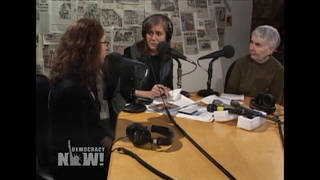
Today in New York, 300 U.S. lawmakers will meet in a special joint session to mark the first anniversary of the September 11 attacks. Congress hasn’t convened in the city in over 200 years. Today’s session will take place at Federal Hall. The hall is located on the site where the First Congress met, where the Bill of Rights was written and where George Washington was inaugurated in 1790 as the first president of the United States.
Transcript
AMY GOODMAN: Today in New York, 300 U.S. lawmakers will meet in a special joint session to mark the first anniversary of the September 11 attacks. Congress hasn’t convened in the city in over 200 years. Today’s session will take place at Federal Hall. The hall is located on the site where the First Congress met, where the Bill of Rights was written and where George Washington was inaugurated in 1790 as the first president of the United States.
Howard Zinn joins us on the phone, a historian who’s author of A People’s History of the United States.
Welcome to Democracy Now!, Howard.
HOWARD ZINN: Oh, thank you, Amy.
AMY GOODMAN: It’s great to have you with us. I’m here with Juan.
JUAN GONZÁLEZ: Well, Howard Zinn, I’d like to ask you: Your impressions on this historic gathering here of the members of Congress in the midst of this perpetual war now that we’re involved in?
HOWARD ZINN: Well, you know, I think — I think it’s good to commemorate the bravery of those firemen and policemen and medical workers and all, and people in the Twin Towers who worked to save the lives of other people. I mean, those are the things that we should be commemorating, that kind of courage. But I don’t find any courage in Congress. And therefore, Congress is the last body on Earth I could imagine to commemorate that event. Congress does not have, you know, the kind of record that can make us proud of our legislative body. And, I mean, Congress — on the one hand, you have this, you know, the courage of the people involved in saving people, and on the other hand, you have the absolute cowardice of Congress in going along with President Bush and replying to September 11th with only the motive of revenge and retaliation and war. And that kind of behavior on the part of Congress does not make me proud of it and does not make me want it — want me to have Congress represent me on an occasion like this.
AMY GOODMAN: What about it being the site of where the Bill of Rights was written?
HOWARD ZINN: And another irony. Congress is nothing but ironic in almost everything it does. And yeah, ironic that it’s meeting on the site of the drafting of the Bill of Rights, when Congress has ignored the Bill of Rights in passing the PATRIOT Act, which sort of drives wedges into the Bill of Rights and cuts it apart. And, you know, Congress, which sits idly by while the attorney general of the United States takes upon himself, you know, kind of Gestapo-like powers to round up people and detain them and violate the constitutional rights of both noncitizens and citizens. So, you know, for Congress to meet there, maybe — maybe the only value of it is to remind us how the Bill of Rights has been ignored by this particular Congress.
AMY GOODMAN: Well, it’s also significant to note that they’ll be right across the street from the Stock Exchange. That might be more significant. And Dick Cheney, the vice president, will preside over the joint session of Congress, who is currently being investigated by the Securities and Exchange Commission for his tenure as the head of Halliburton, the oil services company.
HOWARD ZINN: Yeah. Oh, well, Congress should be meeting in the Stock Exchange. I mean, that would be appropriate, and because, you know, relations between Congress and Wall Street, between Congress and American corporations, you know, has always been an extremely friendly one, beneficial to both sides. And so, yes, I think, you know, that would be a very good thing for Congress to do.
I understand that there’s going to be a rally at Wall Street on September 11th with Ralph Nader and other people sort of pointing out the the connection between corporate wealth represented by Wall Street and the actions of our government in perpetuating war.
AMY GOODMAN: Well, Howard Zinn, I want to thank you very much for being with us.
HOWARD ZINN: Yeah. Well, thanks for doing the job you’re doing, Amy.
AMY GOODMAN: And thank you, Juan. Thank you.
As we move on with headlines, former President Jimmy Carter slammed the Bush administration’s so-called war on terrorism in an opinion piece in yesterday’s Washington Post. In a piece entitled “The Troubling New Face of America,” Carter writes, “[O]ur country has become the foremost target of respected international organizations concerned about these basic principles of democratic life.” Carter writes, “We have ignored or condoned abuses in nations that support our anti-terrorism effort, while detaining American citizens as 'enemy combatants,' incarcerating them secretly and indefinitely without their being charged with any crime or having the right to legal counsel.” Carter also expressed concern over Bush’s rejection of nuclear arms agreements, the Biological Weapons Convention, environmental protection, anti-torture proposals and the International Criminal Court.
And Israeli troops shot dead two Palestinians early this morning in Jenin, attacked a metal factory in the Gaza Strip and announced plans to demolish four homes in Jerusalem owned by relatives of alleged terrorists. On Thursday, Palestinians destroyed a tank and killed two soldiers in the Gaza Strip. And a vehicle packed with about half a ton of explosives was seized by police officers in Israel, averting an attack that the Israeli police say could have killed and wounded hundreds of people.













Media Options